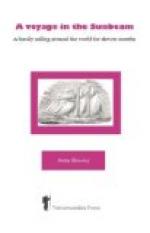The shores of the gulf, on each side, consist of sharp-cut little hills, covered with pines and cryptomerias, and dotted with temples and villages. Every detail of the scene exactly resembled the Japanese pictures one is accustomed to see in England; and it was easy to imagine that we were only gazing upon a slowly moving panorama, unrolling itself before us.
It was twelve o’clock before we found ourselves among the men-of-war and steamers lying near the port of Yokohama, and two o’clock before the anchor could be dropped.
[Illustration: Little Redcap.]
During this interval we were surrounded by a swarm of boats, the occupants of which clamoured vociferously to be allowed on board, and in many cases they succeeded in evading the vigilance of the man at the gangway, by going round the other side and climbing over the rail. A second man was put on guard; but it was of no use, for we were invaded from all directions at once. We had a good many visitors also from the men-of-war, Japanese and English, and from the reporters of newspapers, full of curiosity, questions, and astonishment.
Having at last managed to get some lunch, Tom went to bed to rest, after his two hard nights’ work, and the rest of us went on shore. Directly we landed at the jetty we were rushed at by a crowd of jinrikisha men, each drawing a little vehicle not unlike a Hansom cab, without the seat for the driver—there being no horse to drive. The man runs between the shafts, and is often preceded by a leader, harnessed on in front, tandem fashion. Each of these vehicles holds one person, and they go along at a tremendous pace.
We went first to the Consul’s, where we got a few letters, and then to the Post Office, where many more awaited us. We had then to go to various places to order stores, fresh provisions, coals, and water, all of which were urgently needed on board, and to give directions for the repair of boats, spars, &c., with as little delay as possible. All this business, including the inevitable search for a good laundress, lay in the European quarter of the town, the appearance of which was not remarkable. But the people we met in the streets were a study in themselves. The children said they looked ‘like fans walking about;’ and it was not difficult to understand their meaning. The dress of the lower orders has remained precisely the same for hundreds of years; and before I had been ashore five minutes I realised more fully than I had ever done before the truthfulness of the representations of native artists, with which the fans, screens, and vases one sees in England are ornamented.
While we were going about, a letter was brought me, containing the sad news (received here by telegram) of the death of Tom’s mother. It was a terrible shock, coming, too, just as we were rejoicing in the good accounts from home which our letters contained. I went on board at once to break the bad news to Tom. This sad intelligence realised a certain vague dread of something, we knew not what, which has seemed to haunt us both on our way hither.




